Ireland in the Eurovision Song Contest
Ireland has participated in the Eurovision Song Contest 53 times since making its debut at the 1965 contest in Naples, missing only two contests since then (1983 and 2002). The contest final is broadcast in Ireland on RTÉ One. Ireland has a record total of seven wins, and is the only country to have won three times consecutively.
| Ireland | |
|---|---|

| |
| Member station | RTÉ |
| National selection events | National Final
Internal Selection
|
| Participation summary | |
| Appearances | 53 (45 finals) |
| First appearance | 1965 |
| Best result | 1st: 1970, 1980, 1987, 1992, 1993, 1994, 1996 |
| External links | |
| RTÉ page | |
| Ireland's page at Eurovision.tv | |
Ireland in the Eurovision Song Contest 2021 | |
Ireland's seven wins were achieved by Dana with "All Kinds of Everything" (1970), Johnny Logan with "What's Another Year" (1980) and "Hold Me Now" (1987), Linda Martin with "Why Me" (1992), Niamh Kavanagh with "In Your Eyes" (1993), Paul Harrington and Charlie McGettigan with "Rock 'n' Roll Kids" (1994) and Eimear Quinn with "The Voice" (1996). Johnny Logan is the only performer to have won twice and also wrote the 1992 winning entry. Ireland, who also finished second with Sean Dunphy (1967), Linda Martin (1984), Liam Reilly (1990) and Marc Roberts (1997), has a total of 18 top five results.
Since the introduction of the semifinal round in 2004, Ireland has failed to reach the final seven times, and has twice finished last in the final, in 2007 and 2013. Ireland's only top 10 result in the last 13 contests (2007–19) is Jedward's eighth-place in 2011.
History
Since its debut in 1965, Ireland has missed only two contests, in 1983 in Munich and 2002 in Tallinn. A strike at RTÉ in 1983, meant that the station lacked the resources to send a participant, so RTÉ broadcast the contest with the BBC commentary feed. Ireland was relegated in 2002. In keeping with EBU rules, RTÉ broadcast that years event as they intended to return in 2003, and a TV commentator was sent to the contest in Tallinn. Raidió Teilifís Éireann (RTÉ) is Ireland's representative broadcaster at the contest, the semi-finals are broadcast on RTÉ2 and the final on RTÉ One.[1] All of the Irish entries have been performed in English with the exception of the 1972 entry, "Ceol an Ghrá", which was sung in Irish. Ireland have hosted the contest on seven occasions, all but one of these in the capital Dublin, while the 1993 contest was staged in Millstreet, a town in north-west County Cork with a population of 1,500 people.[2]
Seán Dunphy finished second at the 1967 contest, behind Sandie Shaw, and Pat McGeegan finished fourth in 1968, before Dana gave Ireland its first victory in 1970, performing "All Kinds of Everything". The country's next best result of the 1970s was in 1977, when The Swarbriggs plus two finished third. This was followed by fifth -place finishes for both Colm C.T. Wilkinson (1978) and Cathal Dunne (1979).
Johnny Logan gave Ireland a second victory in 1980, with "What's Another Year". Girl Group Sheeba finished fifth in 1981. Logan then wrote the 1984 entry "Terminal 3", which finished second, performed by Linda Martin. In 1987, Logan became the first and (as of the present day) only performer to win the contest twice, when he won with the self-penned "Hold Me Now". Ireland's most successful decade to date in the contest is the 1990s, which began with Liam Reilly finishing joint second in 1990. Ireland then achieved an unequalled three consecutive victories in the contest. In 1992, 1984 runner-up Linda Martin returned to win with another Johnny Logan composition, "Why Me?". This was followed up by Niamh Kavanagh's victory over Sonia in 1993 with "In Your Eyes" and Paul Harrington and Charlie McGettigan winning in 1994 with "Rock 'n' Roll Kids". The decade saw yet another victory in 1996 when Eimear Quinn won with "The Voice". Ireland also finished second in 1997 with Marc Roberts.
In the 21st century, Ireland has fared less well, only reaching the top 10 on two occasions, with Brian Kennedy tenth in 2006 and Jedward eighth in 2011. Ireland finished last in the final for the first time in 2007, which happened again in 2013. Since the introduction of the semi-final round in 2004, Ireland has failed to reach the final eight times, in 2005, 2008, 2009, 2014, 2015, 2016, 2017 and 2019. In 2018, Ireland qualified for the first time since 2013 with Ryan O'Shaughnessy and "Together".
.jpg.webp)
Ireland has sent 50 entries to the Eurovision Song Contest; of these seven have won and eighteen have finished in the top five. Ireland has been relegated once: in 2001 Gary O'Shaughnessy finished twenty-first with "Without Your Love,". In addition, six Irish entries have featured in the semi-final of the Contest. In 2005, Donna & Joe finished fourteenth in the pre-qualifier, failing to qualify for the final. In 2006, Brian Kennedy finished ninth in the semi-final, ensuring an Irish presence in the Athens final. Kennedy finished tenth in the final. Ireland also featured in the first semi-final in 2008 and in the second semi-final in 2009, however the representatives failed to qualify for the final in both years.
Ireland's recent results in the Contest have been poor in comparison to the 1990s, coming last in 2007 and 2013. At the Contest in 2007, Ireland's representatives were traditional Irish music group Dervish performing "They Can't Stop The Spring". The group, having automatically qualified for the final, finished last with five points, all from Albania. In 2008, Dustin the Turkey failed to qualify for the final with his song "Irelande Douze Pointe", losing out in the semi-final on May 20. The same fate befell Sinéad Mulvey and Black Daisy in the 2009 semi-final on May 14.[3] In 2011 however, Ireland's luck changed as they sent X Factor finalists Jedward. The duo finished in eighth place, with 119 points, thus making them Ireland's most successful entry in 10 years. Their single Lipstick topped the iTunes charts in Austria, Germany, Ireland and Sweden. Jedward represented Ireland again in 2012 with their song Waterline, but after making it through the first semi-final, were only awarded 46 points, finishing in 19th place. In 2019 Sarah McTernan finished last in the second semi final with the song 22. Since her song received fewer points than the last place finisher of the first semi final, her song came in last place over all, making it the worst Eurovision performance for Ireland to date.
Seven singers have represented Ireland more than once at the Contest: Johnny Logan (1980, 1987), Linda Martin (1984, 1992), Niamh Kavanagh (1993, 2010), Tommy and Jimmy Swarbrigg (as "The Swarbriggs" in 1975 and part of "The Swarbriggs Plus Two" in 1977), Maxi (as a soloist in 1973 and as part of Sheeba in 1981) and Jedward in 2011 and 2012.
Eight people have written and composed more than one Irish entry: Brendan Graham (1976, 1985, 1994, 1996), Johnny Logan (1984, 1987, 1992), Tommy and Jimmy Swarbrigg (1975, 1977), Liam Reilly (1990, 1991), Joe Burkett (composer 1972, lyricist 1981), and Niall Mooney & Jonas Gladnikoff (2009, 2010).[4]
In the years when the live orchestra was present in the contest, almost all of Ireland's Eurovision entries were conducted by Noel Kelehan. The exceptions were 1965 (Italian host conductor Gianni Ferrio), 1970 (Dutch host conductor Dolf van der Linden), from 1972 to 1975 (Colman Pearce), 1979 (Proinnsias Ó Duinn), 1994 (no conductor, although Kelehan conducted three other entries from Romania, Greece and Poland) and in 1997 (Frank McNamara was the musical director for the contest staged in Dublin, but the Irish entry was played with a backing track with no orchestra).
Ronan Keating (who also presented the 1997 contest) had collaborated on the 2009 entry for Denmark.[5]
RTÉ presenter Marty Whelan has been the national commentator since 2000.[6]
Records
Ireland holds the record for the greatest number of victories: seven wins including three consecutive wins. The country has also achieved second place four times and third once.
Ireland is one of the few countries to have achieved consecutive wins (along with Spain, Luxembourg and Israel) and the only country to win consecutively three times, and the nation won again in 1996, meaning four victories were achieved in five years.
Ireland is the only country to host the Contest consecutively and is one of eight countries never to turn down the chance to host the Eurovision Song Contest.
Out of 52 appearances and 45 finals, Ireland has reached the top ten 31 times and the top five 18 times. As of 2019, Ireland has not reached the top five since 1997.
Ireland holds the record for most points from one country in a year (alongside France) in the 'one point per juror' voting system, achieving nine votes out of a possible ten from Belgium (in 1970). France had achieved this same feat in 1958.
Ireland has an average of 74 points per contest, the highest average, two points above the United Kingdom.
During the first semi-final of the 2014 contest, it was revealed that the duo, Jedward, hold two Eurovision records: the highest hair (18.9 cm) and the biggest shoulder pads.
Contestants
1 |
Winner |
2 |
Second place |
3 |
Third place |
◁ |
Last place |
X |
Entry selected but did not compete |
Congratulations: 50 Years of the Eurovision Song Contest
Ireland was one of two countries to have two entries entered into Congratulations: 50 Years of the Eurovision Song Contest, with the 1980 entry "What's Another Year?" and the 1987 "Hold Me Now". Co-host of the 1997 contest Ronan Keating appeared. Johnny Logan performed his single "When a Woman Loved a Man". Irish winners Eimear Quinn, Charlie McGettigan and Linda Martin performed as backing singers to most of the songs with Jakob Sveistrup who represented Denmark in 2005. Marty Whelan provided commentary of the contest for Ireland on RTÉ.
| Artist | Language | Title | At Congratulations | At Eurovision | |||||
|---|---|---|---|---|---|---|---|---|---|
| Final | Points | Semi | Points | Year | Place | Points | |||
| Johnny Logan | English | "What's Another Year?" | Failed to qualify | 12 | 74 | 1980 | 1 | 143 | |
| Johnny Logan | English | "Hold Me Now" | 3 | 262 | 3 | 182 | 1987 | 1 | 172 |
Hostings
Ireland is the only country to have hosted multiple contests in succession; three in a row between 1993 and 1995. Six of the seven Contests held in Ireland have been held in Dublin; three at the Point Theatre, two at the RDS and one at the Gaiety Theatre. In addition, the 1993 Contest was held in Millstreet, County Cork. During the 1994 contest, the dancing group Riverdance made their debut as an interval act.
| Year | Location | Venue | Presenters | Photo |
|---|---|---|---|---|
| 1971 | Dublin | Gaiety Theatre | Bernadette Ní Ghallchóir | |
| 1981 | Dublin | RDS Simmonscourt | Doireann Ní Bhriain | |
| 1988 | Dublin | RDS Simmonscourt | Michelle Rocca and Pat Kenny | |
| 1993 | Millstreet | Green Glens Arena | Fionnuala Sweeney | |
| 1994 | Dublin | Point Theatre | Cynthia Ní Mhurchú and Gerry Ryan | |
| 1995 | Dublin | Point Theatre | Mary Kennedy | |
| 1997 | Dublin | Point Theatre | Carrie Crowley and Ronan Keating |
Awards
Marcel Bezençon Awards
| Year | Category | Performer | Song | Final | Points | Host city | Ref. |
|---|---|---|---|---|---|---|---|
| 2011 | Artistic Award[lower-alpha 3] | Jedward | "Lipstick" | 8 | 119 |
Related involvement
Conductors
| Year | Conductor[lower-alpha 4] | Musical Director | Notes | Ref. |
|---|---|---|---|---|
| 1965 | N/A | Host conductor | [8] | |
| 1966 | Noel Kelehan | |||
| 1967 | ||||
| 1968 | ||||
| 1969 | ||||
| 1970 | Host conductor | [9] | ||
| 1971 | Noel Kelehan | Colman Pearce | ||
| 1972 | Colman Pearce | N/A | ||
| 1973 | ||||
| 1974 | ||||
| 1975 | ||||
| 1976 | Noel Kelehan | |||
| 1977 | ||||
| 1978 | ||||
| 1979 | Pronnsías Ó Duinn | |||
| 1980 | Noel Kelehan | [10] | ||
| 1981 | Noel Kelehan | |||
| 1982 | Noel Kelehan | N/A | ||
| 1984 | ||||
| 1985 | ||||
| 1986 | ||||
| 1987 | ||||
| 1988 | Noel Kelehan | |||
| 1989 | Noel Kelehan | N/A | ||
| 1990 | ||||
| 1991 | ||||
| 1992 | ||||
| 1993 | Noel Kelehan | [lower-alpha 5] | ||
| 1994 | No conductor | Noel Kelehan | [lower-alpha 6] | |
| 1995 | Noel Kelehan | [lower-alpha 7] | ||
| 1996 | Noel Kelehan | N/A | ||
| 1997 | No conductor | Frank McNamara | ||
| 1998 | Noel Kelehan | N/A | ||
Commentators and spokespersons
Over the years RTÉ commentary has been provided by several experienced radio and television presenters, including Larry Gogan, Jimmy Greeley, Gay Byrne, Ronan Collins, Pat Kenny and Mike Murphy. However Marty Whelan has provided the RTÉ Television commentary since 2000 although Whelan himself had previously commentated for the 1987 event. Ireland did not participate in the 1983 edition in Germany, nor did they send a commentator to Munich that year, but instead broadcast the BBC feed of the contest with Terry Wogan as commentator, who welcomed viewers in Ireland during his introduction. RTÉ Radio, however, did provide commentary by Brendan Balfe.
Photogallery
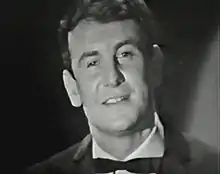 Butch Moore in Naples (1965)
Butch Moore in Naples (1965)_zingt%252C_Bestanddeelnr_923-3687.jpg.webp)
%252C_Bestanddeelnr_928-5033.jpg.webp) Red Hurley in The Hague (1976)
Red Hurley in The Hague (1976)_winnaar_Johnny_Logan_in_aktie%252C_Bestanddeelnr_930-7803.jpg.webp) Johnny Logan in The Hague (1980)
Johnny Logan in The Hague (1980)
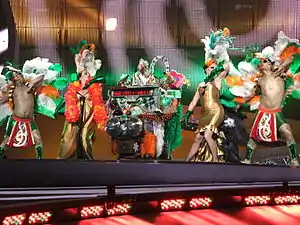 Dustin the Turkey in Belgrade (2008)
Dustin the Turkey in Belgrade (2008)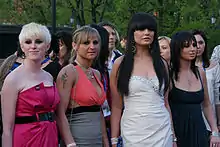
.jpg.webp) Niamh Kavanagh in Oslo (2010)
Niamh Kavanagh in Oslo (2010)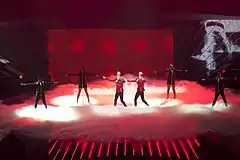
.jpg.webp) Ryan Dolan in Malmö (2013)
Ryan Dolan in Malmö (2013).jpg.webp) Kasey Smith in Copenhagen (2014)
Kasey Smith in Copenhagen (2014)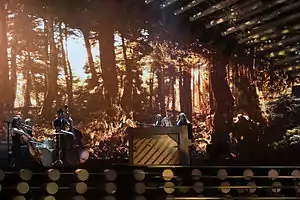 Molly Sterling in Vienna (2015)
Molly Sterling in Vienna (2015)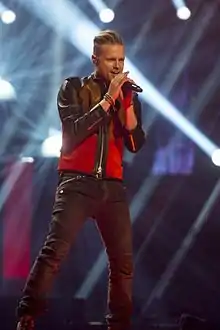 Nicky Byrne in Stockholm (2016)
Nicky Byrne in Stockholm (2016) Brendan Murray in Kyiv (2017)
Brendan Murray in Kyiv (2017).jpg.webp) Ryan O'Shaughnessy in Lisbon (2018)
Ryan O'Shaughnessy in Lisbon (2018)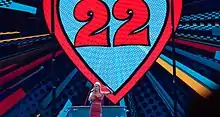 Sarah McTernan in Tel Aviv (2019)
Sarah McTernan in Tel Aviv (2019)
See also
- Ireland in the Junior Eurovision Song Contest – Junior version of the Eurovision Song Contest.
- Ireland in the Eurovision Dance Contest – Dance version of the Eurovision Song Contest.
- Ireland in the Eurovision Young Dancers – A competition organised by the EBU for younger dancers aged between 16 and 21.
- Ireland in the Eurovision Young Musicians – A competition organised by the EBU for musicians aged 18 years and younger.
Notes
- According to the then-Eurovision rules, the top ten non-Big Four countries from the previous year along with the Big Four automatically qualified for the Grand Final without having to compete in semi-finals. For example, if Germany and France placed inside the top ten, the 11th and 12th spots were advanced to next year's Grand Final along with all countries ranked in the top ten.
- The 2020 contest was cancelled due to the COVID-19 pandemic.
- Voted by commentators.
- All conductors are of Irish nationality unless otherwise noted.
- Kelehan also conducted the Bosnian entry.
- Irish commentator Pat Kenny and British commentator Terry Wogan both erroneously credit Kelehan as the conductor of the Irish entry. The song was performed without orchestral accompaniment. Kelehan did, however, conduct the Greek, Polish, and Romanian entries.
- Kelehan also conducted the Polish entry. The interval act, "Lumen," was conducted by Proinnsías Ó Duinn.
References
- RTÉ:Eurovision. RTÉ.ie. Retrieved on 5 September 2007.
- Millstreet. Cork-Guide.ie. Retrieved on 5 September 2007.
- "Ireland dumped out of Eurovision". BBC. 2009-05-15. Retrieved 2009-05-15.
- Diggiloo Thrush - Ireland
- #2 BBC
- "Marty and the 'cool' Irish". Irish Independent. 2006-05-23. Retrieved 2008-11-22.
- "Winners of the Marcel Bezençon Awards". eurovision.tv. 16 May 2011. Retrieved 8 December 2019.
- Roxburgh, Gordon (2012). Songs for Europe: The United Kingdom at the Eurovision Song Contest. Volume One: The 1950s and 1960s. Prestatyn: Telos Publishing. pp. 93–101. ISBN 978-1-84583-065-6.
- Roxburgh, Gordon (2014). Songs for Europe: The United Kingdom at the Eurovision Song Contest. Volume Two: The 1970s. Prestatyn: Telos Publishing. pp. 142–168. ISBN 978-1-84583-093-9.
- Roxburgh, Gordon (2016). Songs for Europe: The United Kingdom at the Eurovision Song Contest. Volume Three: The 1980s. Prestatyn: Telos Publishing. ISBN 978-1-84583-118-9.
External links
- Ireland Eurovision fan website escireland.com
- Points to and from Ireland eurovisioncovers.co.uk
- Irish Eurovison Winners DVD ebuzz.ie